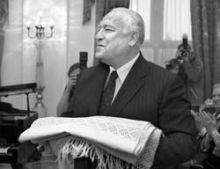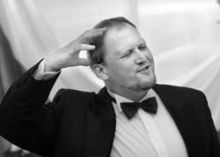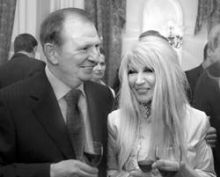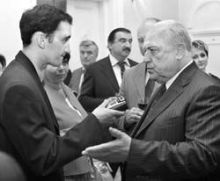The Embassy of the Russian Federation in Kyiv held a soiree commemorating Ambassador’s Viktor Chernomyrdin’s fifth anniversary at his post.
The Russian diplomat decided to stage the celebration as a soiree that would include a concert to which he invited his colleagues from the diplomatic corps as well as Ukrainian politicians, businessmen, and various scholars and cultural figures. During his tenure the ambassador revived events that were once very popular, such as diplomatic salons. In the past several years the musical soirees at the Russian Embassy have become traditional. Guests love them and artists gladly come to perform for Chernomyrdin, even though such festive occasions can hardly make up for the tense relations between Kyiv and Moscow. During the recent soiree there was no evidence of any complications in the Ukrainian-Russian dialogue. When The Day’s journalists tried to broach the question of how to improve cooperation, some guests were surprised: “Why do you want to talk about painful subjects right now?”
May 30 is a special date for Chernomyrdin. Five years ago he arrived in Kyiv as Ambassador Extraordinary and Plenipotentiary of the Russian Federation to Ukraine, as well as the Russian president’s special envoy empowered to supervise Russian-Ukrainian trade and economic relations. That day Chernomyrdin submitted his credentials to President Leonid Kuchma of Ukraine (the ex-president was present at last week’s soiree). Five years ago the noted Russian politician’s arrival in Kyiv was received with varying emotions: many people were outraged by President Vladimir Putin’s announcement of a new ambassador to Ukraine without first coordinating the appointment with the Ukrainian side-standard diplomatic practice.
Experts immediately started talking about Russia’s growing influence on Ukrainian politics. Today’s diplomatic corps in Ukraine is hardly conceivable without Chernomyrdin, without his direct and friendly attitude, even without his coarse jokes. The recent diplomatic reception took place in the same kind of atmosphere.
Ambassador Chernomyrdin was greeted by singers, musicians, and actors who, after their debut at the “diplomatic salon,” have become frequent guests at the musical soirees organized by the Russian Embassy. Ukrainian National Opera soloists Alla Pozdniak, Dmytro Popov, Iryna Semenenko, Taras Shtonda, Olha Nahirna, Andriy Romanenko, and the Hetman Quartet sang Ukrainian folk songs and Russian romances in Russian, Ukrainian, Italian, and English. Serhiy Oziriany and Iryna Hryshchenko, actors from the Russian Drama and Podil Theaters, who traditionally play the roles of Jack Frost and the Snow Maiden during Christmas celebrations at the Russian Embassy, performed the humorous ballad “Niby vymerlo vse do svitanku” [Everything Seemed to Have Died by Sunrise], singing lyrics that were written especially for the occasion.
Chernomyrdin’s favorite bayan (button accordion) was also played by the virtuoso Viacheslav Samofalov of the National Philharmonic. During the finale the actors and guests joined in singing “Mnohaia lita.” The ambassador was deeply moved and did not try to conceal his emotions. Then, with his innate sense of humor he said, “OK, time to go. Five years have passed like one day.” He said later that this was the final concert before the summer vacations, but that he has plans for the next season, and that by the end of September the “diplomatic salon” will resume its activities.
These musical soirees have become very popular in Kyiv. On the one hand, excellent compositions are performed by leading Ukrainian singers; on the other, after each concert the guests can communicate with politicians and artists in an informal atmosphere. While the atmosphere was pleasant inside the embassy, outside no one would attempt to describe Ukrainian-Russian relations as unclouded: there are many acute problems to resolve, ranging from the gas conflict to the Black Sea Fleet. The Day took advantage of the occasion to interview distinguished representatives of the Ukrainian political beau monde and cultural elite, and asked them the following question: “What should be done to improve Russian-Ukrainian relations?”
“First of all, our current politicians should have a head on their shoulders,” was the laconic reply from ex-President Leonid Kuchma, who was the center of attention.
“Both sides should put aside their ambitions,” said National Opera soloist Svitlana DOBRONRAVOVA, adding, “I am of Russian descent, but Ukraine has become my second homeland. It was here — first in Lviv and then in Kyiv — that I made my name as on opera singer. I love Ukraine, so it’s painful to realize that relations between our two countries have worsened lately. I believe that politicians are not the only ones responsible for this situation. Everyone must answer the simple question, “What are you trying to achieve in your lifetime?”
“Today, the Russian and Ukrainian media are focusing on negative aspects, which are snowballing. This shouldn’t be happening. Ambitions are boiling up in politicians, who are trying to outsmart each other. The people upstairs cannot give up their principles, they are arguing. But as the saying goes, when the lords are fighting, it is our heads that ache. It’s a shame that there is practically nothing we can do to help the situation. I am not a politician, but I think that a private conversation between Vladimir Putin and Viktor Yushchenko would solve a number of problems that have remained unresolved for months. However, both heads of state appear to be dominated by personal ambitions — although on the level of art and culture we solve our problems very quickly. So I’m calling on everyone— members of parliament, politicians, and diplomats-to be concerned not just about today’s realities, but also about the future of our countries.”
“Let those currently in power ponder this question; they are responsible for their actions,” said Mykola BILOBLOTSKY, former Ambassador of Ukraine to Russia. “I spent six years working in Moscow, trying to improve our relations. Of course, I wasn’t able to accomplish everything as planned, but there were positive results. When I started my work as ambassador, the Ukrainian- Russian commodity turnover amounted to 8.4 billion dollars; by the time I was flying back to Kyiv, it had reached 21 billion.
“Politics and diplomacy are not simply parlor sessions. You not only have to work but make sure that people who are responsible for intergovernmental relations actually assume this responsibility. Ukraine and Russia are independent countries. Their relations must be balanced instead of relying on the “who-prefers-what” principle. Life, economy, history, and society demand that we combine our efforts to build normal Ukrainian-Russian relations. Acting one way today and a different way tomorrow is unacceptable. Ukrainian-Russian relations should be normal, although I have no recipes. This autumn we will see precisely how well our politicians and diplomats have performed in this direction.”
“The hardest thing in life is building relationships: in a family, production team, and especially between two nations,” stressed Serhiy OZIRIANY, an actor with the Lesia Ukrainka Theater. “There will always be people who find pretexts for grievances and others who react to them. Such negativity should not be cultivated. Every individual believes that only s/he is right and everybody else is to blame. You want to change? Then start working to improve yourself. Personally, I have good contacts with my colleagues in Russia.
“You know, in order to keep a fire going, you have to throw logs on it, not keep track of who brought more. The same is true of intergovernmental relations; you have to learn to take the first step to meet the other person halfway, and to forgive past offences. As far as I am concerned, our politicians appear to be dazed by their success. A lot of loud statements have been made but very few concrete deeds accomplished. I’m calling on Ukrainians to be wise and persevering. We are still going around in circles, but I view the future with optimism.”
Kostiantyn HRYSHCHENKO, the former Ukrainian foreign affairs minister, said: “It is necessary to shift from declarative rejection, an attitude that has become more exacerbated lately, to a search for those themes and spheres that can give fresh impetus to our relations. If we fail to open up new opportunities, we won’t be able to solve the problems confronted by both our states. Russia should be regarded as a field of opportunities, not as an eternal threat. Unless we overcome this stereotype, maintaining cooperation will prove rather difficult.”
The Day asked the former minister how Ukraine should respond to the Russian Duma members’ question on the Crimea’s return to the Russian Federation. “There are always people in any country — here and in Russia — who only look for excuses to complicate the situation. In this way they are trying to show that they are ultrapatriots. Patriotism, however, does not lie in raising issues that have long been closed, but in an ability to understand each side, in a willingness to seek compromise. Therefore, we shouldn’t respond to any attempts by people who are trying consciously to receive a negative reply. This would mean playing the game by their rules — and playing into their hand,” said the ex-minister of foreign affairs.
Anatoliy ZLENKO, another ex-foreign affairs minister of Ukraine, had this to say about our relations with Russia. “There are many issues on the current agenda that have piled up after the Soviet Union’s collapse. We haven’t been able to resolve all of them. We have to change the tune, change the negotiating method. Only then will we be able to spot partners whom we can trust and who will trust us. We must always find persuasive rather than aggressive arguments; there must be a tactic worked out well in advance. At the same time we should have a friendly attitude to one another. The Russian side must also realize that a number of problems have been accumulated that can no longer be shelved. We must reach a compromise; we must include certain concessions in the negotiation process so that we can draw closer to mutual understanding step by step. We are fated to normal, good-neighbor relations with Russia.”
In regard to territorial claims on the part of certain Russian MPs, the ex-foreign minister said: “It is certainly unpleasant to realize that there are politicians who are trying to exacerbate our relations in this manner. Ukraine has experience in resolving such problems. A vivid example is the way the UN Security Council dealt with Russian parliamentarians’ claims in 1993 concerning Sevastopol. The final decision was in favor of Ukraine. Therefore, we know there are mechanisms that can warn those who try to encroach on the territorial integrity and inviolability of our borders. The main thing is that in its policies Ukraine rejects any territorial claims and presses no claims with regard to its neighbors. I believe this must serve as the basis for developing normal and neighborly relations.”











